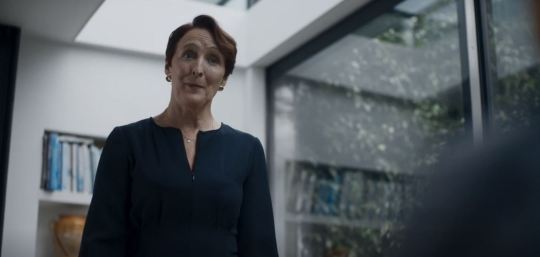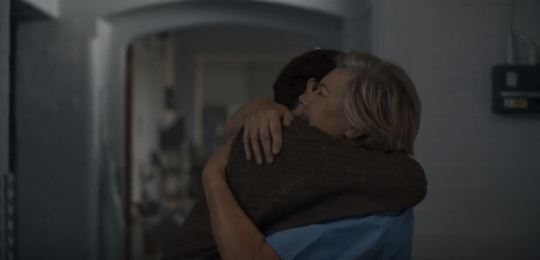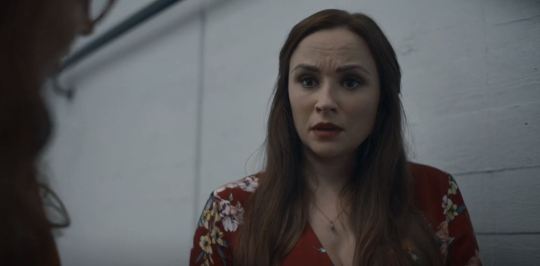#when my character woke him up and explained theyre struggling not to kill him hes immediately like
Explore tagged Tumblr posts
Text







he's so chill and sweet and hilarious about my dark urge character getting possessed and trying to kill him in the night while screaming about tearing his eyes out and feeding them to dogs 🥰
#when my character woke him up and explained theyre struggling not to kill him hes immediately like#'oh is this what we're doing now? bet'#and the amount he pokes fun at them for it later is very endearing to me#there are also lines from way early in the playthrough where he immediately finds their murdery vibes endearing and is kind of doting abt i#haley plays bg3#bg3 spoilers
644 notes
·
View notes
Text
Killing Eve + making worlds and workplaces for women
killing eve very frequently – and obviously quite rightly – gets discussed as a feminist screen text, but i feel like we often talk about the individual characters, how fantastic they clearly are, and how flawed/developed/multifacted/interesting they’ve grown to be. but another thing killing eve does phenomenally well is subvert power structures and institutions, and populate them with women in a way we rarely see. for example, in season 1, eve’s MI5 office is unusually gender-balanced for television (it’s her, elena, bill and frank), and when carolyn is introduced, she’s immediately painted as almost an urban legend – elena raves about how incredible she is and how much she’d love to work with her, and we’re positioned to view her with intrigue and awe. this “mysterious, unreadable, probably damaged but definitely utterly competent and slightly amoral” character would typically go to a man – probably a slightly misogynistic one who’d gradually form a “grudging respect” for the women on his new team, as the women act as a device to coax him into the New Modern World and soothe his trauma. but carolyn gives this archetype an internal makeover and new vitality, and neatly sidesteps stereotyping: she’s not a “bitchy boss”; she never yells, or insults; she’s at times eerily calm, and methodically works her way through problems. this is especially poignant when we think of male characters who rail against female leaders for being “too emotional”, and proceed to spend half the movie throwing tamper-tantrums. at the same time, though, she doesn’t feel emotionless to prove a point, or simply to be the stoic; we get a very real sense of her pragmatism and cold war-conditioning, and the interlocking mechanisms of her many layers. carolyn’s character (both her writing and shaw’s acting) are totally genius, but the main point im trying to raise here is that the parts of Mentor and Career Aspiration are inhabited by a woman, and 60yo woman going full-speed at that – not someone who’s barely 39 but treated as basically a retiree.

next, we’ve got carolyn’s boss, played by zoe wanamaker in 2x04. yes, she’s not in the show for long – although she may make a reappearance? not sure – but her value is more symbolic than anything. in her scene, we get the impression of her power (she gets to make carolyn wait :o), and while she’s also a severe older woman, she’s very much distinct from carolyn in personality, which is pretty unique; often, writers will prescribe bulk-identities to all their minor characters who fall into certain groups, out of a mix of laziness and ignorance. anyway, wanamaker’s helen is shown eating (another rant-worthy point is how the frequency and ease with which killing eve’s women are portrayed as actually eating food is tragically radical), and she lashes out at carolyn before soothing herself easily once again – she’s capricious and less reserved and measured than carolyn, but equally potent. we also get a strong vibe of a long and complex working relationship between these two, effortlessly implied by the writing and performance and even if we never double-back to it, it colours how we view carolyn and the system that i’ll (eventually) get around to making my argument about.

lastly, there’s julie, who plays the medical examiner in 2x01, and conducts the exhumation autopsy on allistair peel. she comes across as professional, capable, no-nonsense, but also warm and gallows-funny, hugging carolyn and sympathetic to eve’s slightly strange reaction to the corpse. like helen, she’s not in the show long, but it’s more her relevance as a symbol i want to discuss.

so what am i getting to by going on about carolyn and these relatively minor characters? well, i want to talk about how killing eve establishes for itself something of an ‘old girls’ club’. an ‘old boys’ club’ is the network of connections that form between (generally upperclass) men who went to the same schools or worked in the same companies, who get each other opportunities in a pay-it-forward kind of way throughout life; it’s one of the many ways that sites of privilege are maintained as sites of privilege. but with these older female characters, who all know and support each other, give each other second chances or off-the-books help, killing eve constructs its own version. through these interactions, we have the sense that carolyn is a part of a group of women across the government who ensure certain things happen at certain times for certain people.
even outside this senior boss ladies network, we have elena, eve and jess, who support and challenge and contradict each other – all successful women with different skillsets, trajectories, relationships, etc., and none of whom are white. not only does this show pass the bechdel test in under three minutes, but that conversation is between two women of colour. one of the many things i love about killing eve is that while it acknowledges (and even leverages) the disadvantages that marginalised groups face – e.g. villanelle is able to exploit conforming to the western ideals of femininity to lure men into a false sense of security; the ghost is able to pass through places unnoticed, etc. – it never makes that the core of the narrative. it isn’t focused on reinforcing these systemic barriers over and over, which is something a lot of shows do when they’re trying to be progressive, and all they end up doing is reminding us of the setbacks we face and how it’ll be a long, arduous struggle to improve things. instead, killing eve gives a nod to this sexist, racist, homophobic reality, but sidelines it, the way minorities are so often sidelined. rather than make all eve’s bosses and colleagues men “for the realism”, it throws a few male characters in there and then focuses on the women (look how much screentime kenny and hugo get compared to jess, another first-tier secondary character). it reimagines the chain of command as belonging to women, it takes power and allocates it how it sees fit. i adore this, because if someone said to the writers, “umm… i feel like there should be more men in charge… that’s just how it is…”, their response would probably be, “so what?” it wants to spend time with complex women in complex situations, so it just puts them there; there’s no spinning of the wheels to justify how so many women got to these high-ranking jobs in an institution designed to keep them in the lobby. it certainly never pretends women don’t have to cater to men and their sensibilities (take carolyn comforting frank in season 1), but it doesn’t get caught in ‘liberal’-dude-writer “look at these (skinny/pretty/fantasy-fulfillment) women push through the system and affect change from behind the scenes by showing their cleavage to *trick* men into doing what they want ;) girlpower, ladies”. it lets women BE the scene, unapologetically, without feeling pressed to explain or defend or negotiate by stuffing an equal number of male characters in. we get konstantin and aaron peel and various ambassadors or clerks who are men, but these are all characters on the outside looking in. killing eve isn’t arranging women as spaced out and in competition with each other; aside from villanelle, they’re all on the same side (and villanelle’s temporarily teamed up with them anyway), and they work together, while still being allowed internal tensions and clear relationships. i originally just intended to talk about how killing eve built us an old girls’ club, but i had More Thoughts, so that’s why this essay doesn’t stay totally on-thesis from here on, even though it is all about women and their positions in the narrative/workplace. another note – these women, for the most part, aren’t there to be love interests. we obviously have eve/villanelle, but they both have their own fully-developed characters, plus, their love interests are each other, not men. we have carolyn, but her affairs don’t control her storyline; they flit in and out, and are of far more signifiance to the men than to her – she’s an older woman who controls her sexuality, but doesn’t have any interest in letting it overtake her work (and we don’t have that ridiculous “uptight bitch learns to put relationship with basic bro above her lifelong career dream”). we have gemma, but while her narrative function is to give niko a final straw to leave, and to push eve further, she has agency in her arc; SHE is the one who pursues niko, and she does this in a respectable and understandable way. she’s not the “sexy temptress” who “lures” him away, and nor is she an “innocent” that he actively chases.

also, NONE of the women have their qualifications questioned. there is no “is carolyn experienced enough to have so much free reign?”, no “how did eve get to MI5?”. the way we’re always told to with male characters, the show expects us to accept that they’re fit for their roles. this is highlighted when eve kind of stumbles into being an authority on female assassins. she doesn’t have a phd in psych or anything, but she clearly has an affinity in her area, and she VERY quickly learns to own that. the first time carolyn calls her their resident expert, eve is a bit surprised, but then she’s just like, “huh, guess i am”, and runs with that confidence. these women are all tough, but they don’t have to dig out their own spaces. theyve got them, and the audience isn’t gently directed into wondering whether they actually should. we KNOW they should. unsurprisingly, considering much of killing eve is written/overseen by women, but this isn’t done for Woke Points. there’s no constant self-conscious grandstanding about how many women are in the series. the actors and writers talk about it in press, because theyre EXCITED, theyre THRILLED to finally have this, but that comes from a genuine place of joy to be involved in such a project, rather than a hapless grab for viewers. the female characters aren’t half-baked stocking-stuffers to net the 18-35W. theyre Actual Characters. bottom line is, isn’t it so nice? isn’t it so lovely to be watching something, and have women be in the foreground AND the background? to not have to smurfette effect, the “one of the main characters is a girl, can’t you just shut up now? smh so greedy”? to have minor female characters not as sexy set-dressing or rivals or “ew she’s ugly here’s what we don’t want our protagonist to be hahah amirite lads”? we get to see ourselves over and over, in so many different iterations. killing eve’s women aren’t just “empowered”, they HAVE POWER. they are in positions where they can use that power for good or bad or both, but they have sway and influence and we don’t have to watch a 22yo ingenue assimilate to a 98% male workplace. female characters in killing eve are REAL and PRESENT and we have an entire textured world that isn’t just modern, it’s extra-modern. we have our cake and eat it too: there are women throughout the workplace hierarchy but we still get a critique of how men manipulate the game, and both are managed expertly to ensure we get the social commentary AND get to enjoy the experience of watching women be intelligent and morally grey and sophisticated and manipulative and and AND. in conclusion, i will no longer be accepting applications from media that doesn’t have women in their cast because it “isnt realistic”. killing eve is tearing it up out there, and it’s almost overwhelmingly relieving to get to experience media like this.
*btw, im not trying to imply there are no women actually working at MI5. im sure there are many, but this is more a commentary on media interpretations (james bond, etc.), and the male dominated government landscape in general.
#killing eve#ke#killing eve s2#killing eve season 2#villainever#mine#villainever writes#villanelle#eve polastri#carolyn martens#ke analysis#villaneve#villanevest writes
398 notes
·
View notes